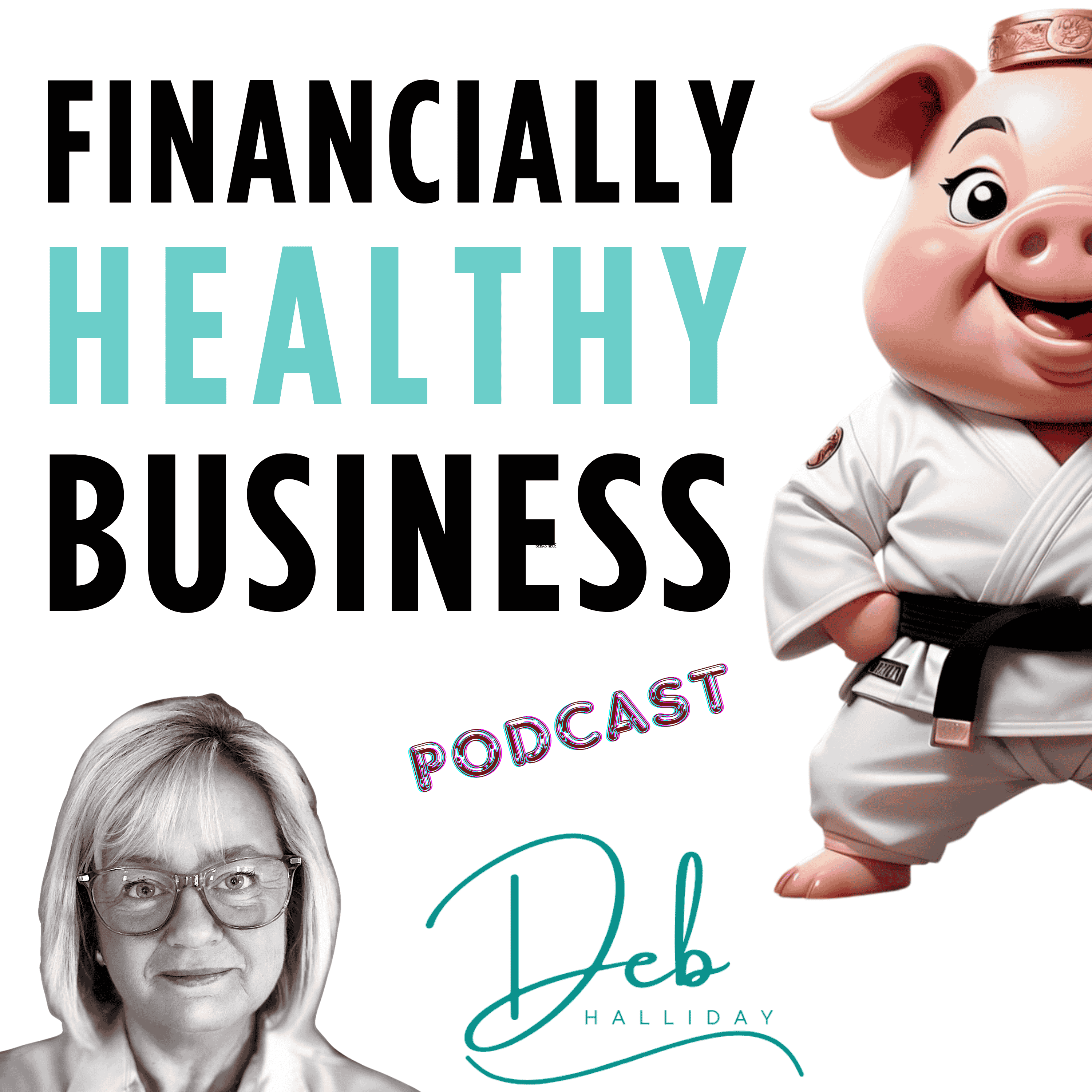Why Mixing Owner's Pay and Director's Loans Can Lead to Financial Chaos
In this episode, we’re clearing up a costly confusion: the difference between owner’s pay and director’s loans.
I’m Deb, a Profit First Professional, and I’m here to help limited company owners avoid a common financial trap—treating business money like personal cash. Blurring the line between your compensation and ad hoc withdrawals can lead to tax headaches, financial instability, and HMRC issues.
We’ll unpack what constitutes proper owner’s pay, when a director’s loan is appropriate, and how to build a structured, sustainable system that ensures you’re paid consistently and fairly. Because the goal isn’t just to grow a business—it’s to build one that pays you properly and supports your lifestyle.
About the Podcast:
This episode of the Financially Healthy Business Podcast focuses on an essential principle: keep your finances clean, clear, and intentional.
I’ll explain why confusing personal income with business funds puts you at risk—not just financially, but emotionally too. We’ll cover:
- The purpose and risks of director’s loans
- Why a regular pay structure matters
- How to track, manage, and separate your income streams
You’ll walk away with the clarity to set up smarter systems and the confidence to handle your pay like a real business owner—not like a bank account with a blurred boundary.
With just 15–20 minute episodes, this podcast helps you take back control of your business finances—so you can lead with purpose, profit, and peace of mind.
Pay yourself properly. Protect your business. Lead with clarity..
Takeaways:
- Establishing a consistent owner's pay is essential for maintaining clear financial boundaries between personal and business finances.
- Understanding the distinction between owner's pay and director's loans is crucial to avoid potential tax complications.
- Failing to manage director's loans responsibly can lead to unexpected tax liabilities and financial stress for business owners.
- Regularly consulting with an accountant can provide invaluable guidance in setting up a sustainable owner's pay system.
- Implementing a structured approach to personal withdrawals from the business can enhance both financial clarity and confidence.
- Prioritizing intentionality in how we pay ourselves fosters a healthier relationship with our business finances.
Links referenced in this episode:
Companies mentioned in this episode:
- Accounts Ladies
- Accounts Office Academy
- HMRC
Transcript
Foreign Healthy Business Podcast for business owners who want the confidence on cash flow that supports the life they actually want to live.
Speaker A:I'm Deb Halliday, Profit first, professional founder of award winning accountancy practice the Accounts Ladies and the Accounts Office Academy and author of how to Build a Financially Healthy Business.
Speaker A:Learn how to take control of your finances, reduce stress, and grow sustainably because your business should support your life, not consume it.
Speaker A:Let's get started.
Speaker A:Hello again and welcome back to the Financially Healthy Psych Business Podcast.
Speaker A:I'm Deb Halliday and today we're tackling a topic that's absolutely critical, especially if you run a limited company.
Speaker A:We're talking about the difference between owner's pay and a director's loan, and why blurring the lines between the two can land you in hot water.
Speaker A:If you've ever taken money out of your business account without a clear plan, this episode is for you.
Speaker A:We're going to clear up the confusion, save you from potential tax headaches, and get you treating yourself like the valuable business owner you are.
Speaker A:So grab a cuppa and let's dive in.
Speaker A:If you're constantly dipping into your business account for personal expenses, maybe to cover a bill or grab some cash for a weekend away, you're not alone.
Speaker A:But here's the thing.
Speaker A:When you take money out of your business without a system, you're not paying yourself.
Speaker A:You're borrowing from your own company.
Speaker A:And trust me, that can get messy fast, both financially and with hmrc.
Speaker A:So let's break this down and make it crystal clear.
Speaker A:First, let's talk about owner's pay.
Speaker A:This is the money you, as the business owner, take out of the company as your reward for running the show.
Speaker A:It's like a salary, but for you.
Speaker A:Owner's pay should be planned regular and intentional.
Speaker A:For example, you might decide to pay yourself £1,000 every month, transferred to your personal account on the 1st.
Speaker A:That's your owner's pay and it's meant to cover your personal bills, rent, groceries, maybe a coffee or two.
Speaker A:The key here is consistency.
Speaker A:It's not a random grab whenever you need cash.
Speaker A:It's a deliberate decision that keeps your business and personal finances separate.
Speaker A:Now contrast that with a director's loan.
Speaker A:This is when you take money out of the company that isn't your owner's pay, dividends or an expense reimbursement.
Speaker A:It's essentially borrowing from your business.
Speaker A:Say your car needs a 300 pound repair and you pull that money from the business account because it's there.
Speaker A:That's a director's loan.
Speaker A:The catch?
Speaker A:It must be repaid, usually within 9 months of your of your company's year end, or you could face tax consequences if you don't repay it.
Speaker A:HMRC might charge you a tax penalty called a section4.5 tax, which can be as high as 33.75% of the loan amount.
Speaker A:Plus, if the loan is over 10,000 pounds, it could be treated as a benefit in kind, Adding more tax complications.
Speaker A:Not fun, right?
Speaker A:I've seen this happen more times than I can count.
Speaker A:A client of mine, James, was running a small design agency before he came to us.
Speaker A:He got into the habit of pulling money out whenever he needed it.
Speaker A:£200 here for an evening out, £500 there for a weekend away.
Speaker A:By the end of the year, his accountant told him he had a £15,000 director's loan.
Speaker A:Not only did he have to figure out how to repay it, but he also got hit with a tax bill he wasn't expecting.
Speaker A:It was a stressful lesson, but it taught him to set up a proper owner's pay system.
Speaker A:And he hasn't looked back since.
Speaker A:So why does this matter?
Speaker A:Because mixing owner's pay and directors loans creates chaos.
Speaker A:It makes it harder to track your finances, plan your taxes, or even know if your business is profitable.
Speaker A:And let's be honest, it adds stress you don't need.
Speaker A:The goal is to run your business with clarity, not to be scrambling at tax time.
Speaker A:Here's how to stop blurring the lines and take 1.
Speaker A:Set a regular owner's pay.
Speaker A:Decide on an amount you can afford, even if it's small, like £1,000amonth, and stick to it.
Speaker A:Schedule it like you would any other bill.
Speaker A:This shows your business and HMRC that you're treating yourself as a key part of the operation.
Speaker A:2 Track any directors loans separately.
Speaker A:If you do need to borrow from the business, document it.
Speaker A:Write down the amount, the date and when you plan to repay it.
Speaker A:Use a simple spreadsheet or even a notebook.
Speaker A:For example, 300 pounds on June 1 for car repair.
Speaker A:Repay by August 1.
Speaker A:This keeps everything above board.
Speaker A:3 Talk to your accountant.
Speaker A:If you've already taken out loans or aren't sure where you stand, you get professional advice.
Speaker A:They can help you set up a repayment plan or adjust your owner's pay to avoid loans in the future.
Speaker A:Your action step this week is to set up your owner's pay system.
Speaker A:Here's how to do it.
Speaker A:Look at your business's monthly average income and expenses.
Speaker A:Let's say you bring in £4,000 and spend £2,500.
Speaker A:That leaves £1,500.
Speaker A:Decide what portion of that you can take as owners pay.
Speaker A:Maybe start with 600 or 800 pounds.
Speaker A:It doesn't have to be huge, just consistent.
Speaker A:Put it in your calendar as a recurring transfer like owners pay 600 pounds on the first and if you've taken money out recently, note it as a director's loan and plan how you'll repay it.
Speaker A:Let's stop winging it.
Speaker A:When it comes to paying ourselves, you're the most valuable person in your business.
Speaker A:Treat yourself like it.
Speaker A:Start paying yourself with intention and you'll feel the difference in your confidence and your finances.
Speaker A:Thanks for joining me today.
Speaker A:Next time, we're diving into the quiet power of profit margins because sales are great, but profit is what really pays you.
Speaker A:Until then, take care of and keep those finances clear.
Speaker A:Thanks for tuning in to the Financially Healthy Business podcast.
Speaker A:If today's episode helped you take a step closer to building a business that supports your life, share it with a fellow business owner, follow the show or leave a review.
Speaker A:It all helps to get the message to the people that need it.
Speaker A:For further Support, head to www.health.financially healthy business.co.uk to find out more information on my online coaching program.
Speaker A:You didn't start your business just to survive.
Speaker A:You started it to thrive.
Speaker A:Till the next time.

